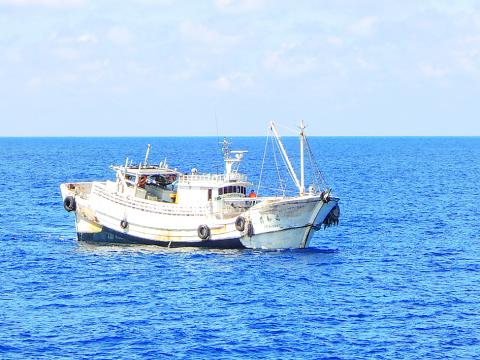Democratic Progressive Party (DPP) lawmakers yesterday urged the government to submit plans to create a ministry for maritime affairs within one year.
Additionally, a basic law governing maritime affairs should be passed by late next year, lawmakers Lai Jui-lung (賴瑞隆), Chen Man-li (陳曼麗) and Kolas Yotaka told a news conference at the legislature.
The measures are to help integrate maritime policy across sustainable development, research and sea tourism, they said.

Photo: Huang Hsu-lei, Taipei Times
Directorate-General of Personnel Management official Yang Hsiu-chen (楊秀珍) said the government is to complete a draft bill for review at the next session of the Legislative Yuan.
In June 2015, the legislature passed the Organization Act of the Ocean Affairs Council (海洋委員會組織法), which would have mandated the creation of the ocean affairs council in July last year.
However, the legislators who took office in March last year passed a resolution to suspend the council’s promulgation.
Lai, Chen and Chinese Nationalist Party (KMT) Legislator Apollo Chen (陳學聖) laster proposed amendments to the law that would upgrade the ocean affairs council to a ministry-level organization.
Distributing responsibilities over environmental protection, tourism and other maritime issues to multiple agencies has the effect of diluting the government’s efforts, said Lai, a former Kaohsiung Marine Bureau director.
“On the day before World Oceans Day, I call on the Executive Yuan to accelerate the establishment of the ministry for maritime affairs; only a powerful, responsible agency can promote policies,” he said.
Lai said Indonesia and Sweden have a ministry-level agency to supervise maritime affairs, while Japan and Canada have a basic law governing oceanic issues.
As a maritime nation, Taiwan urgently needs a ministry of maritime affairs, Lai said.
Lawmakers suspended the council because they believe the President Tsai Ing-wen (蔡英文) administration should have a ministry-level establishment overseeing seas, Lai said.
Kolas Yotaka said a maritime affairs ministry is symbolic of Taiwan’s identity as an independent state and would help many Aborigines who live by rivers and the ocean.
Calls to create a maritime affairs ministry have been raised many times over the past two decades, National Taiwan Ocean University Institute of Marine Affairs and Research Management dean Julia Huang (黃向文) said.
The fishing industry’s use of oceanic resources are poorly regulated and are misunderstood by the government, she said.
Ocean acidity levels and marine debris in the nation’s seas are not included in Environmental Protection Administration surveys, Huang said.
There are a large number of international laws regulating the use of the sea that the government has yet to implement, she said.
“Although Taiwan prides itself as a maritime nation, government organizations are poorly coordinated and communications between them is spotty,” she said.
“The public has gained more ocean awareness and there are many initiatives by private citizens to clean beaches or protect the ocean. The government should not fall behind the people’s lead. A ministry of maritime affairs should be created as soon as possible,” she added.
Greenpeace Taiwan oceans campaigner Yen Ning (顏寧) said the past two administrations had both affirmed the importance of the ocean, but did little to resolve the competing needs of resource use, conservation and development.
Taiwan should have a ministry of maritime affairs at the earliest possible time and the government should push for truly forward-looking policies, Yen said.

An essay competition jointly organized by a local writing society and a publisher affiliated with the Chinese Communist Party (CCP) might have contravened the Act Governing Relations Between the People of the Taiwan Area and the Mainland Area (臺灣地區與大陸地區人民關係條例), the Mainland Affairs Council (MAC) said on Thursday. “In this case, the partner organization is clearly an agency under the CCP’s Fujian Provincial Committee,” MAC Deputy Minister and spokesperson Liang Wen-chieh (梁文傑) said at a news briefing in Taipei. “It also involves bringing Taiwanese students to China with all-expenses-paid arrangements to attend award ceremonies and camps,” Liang said. Those two “characteristics” are typically sufficient

A magnitude 5.9 earthquake that struck about 33km off the coast of Hualien City was the "main shock" in a series of quakes in the area, with aftershocks expected over the next three days, the Central Weather Administration (CWA) said yesterday. Prior to the magnitude 5.9 quake shaking most of Taiwan at 6:53pm yesterday, six other earthquakes stronger than a magnitude of 4, starting with a magnitude 5.5 quake at 6:09pm, occurred in the area. CWA Seismological Center Director Wu Chien-fu (吳健富) confirmed that the quakes were all part of the same series and that the magnitude 5.5 temblor was

The brilliant blue waters, thick foliage and bucolic atmosphere on this seemingly idyllic archipelago deep in the Pacific Ocean belie the key role it now plays in a titanic geopolitical struggle. Palau is again on the front line as China, and the US and its allies prepare their forces in an intensifying contest for control over the Asia-Pacific region. The democratic nation of just 17,000 people hosts US-controlled airstrips and soon-to-be-completed radar installations that the US military describes as “critical” to monitoring vast swathes of water and airspace. It is also a key piece of the second island chain, a string of

The Central Weather Administration has issued a heat alert for southeastern Taiwan, warning of temperatures as high as 36°C today, while alerting some coastal areas of strong winds later in the day. Kaohsiung’s Neimen District (內門) and Pingtung County’s Neipu Township (內埔) are under an orange heat alert, which warns of temperatures as high as 36°C for three consecutive days, the CWA said, citing southwest winds. The heat would also extend to Tainan’s Nansi (楠西) and Yujing (玉井) districts, as well as Pingtung’s Gaoshu (高樹), Yanpu (鹽埔) and Majia (瑪家) townships, it said, forecasting highs of up to 36°C in those areas